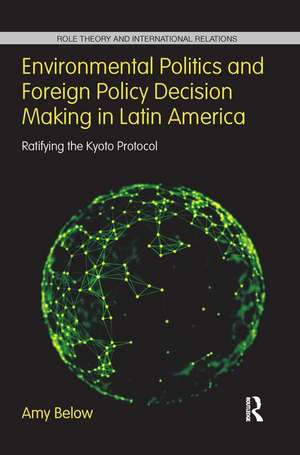Environmental Politics and Foreign Policy Decision Making in Latin America: Ratifying the Kyoto Protocol: Role Theory and International Relations
Autor Amy Belowen Limba Engleză Paperback – 18 noi 2016
Below’s study takes a regional perspective in order to examine why countries in Latin America made disparate foreign policy choices when they were faced with the same decision. The book looks at the decisions in Argentina, Mexico, and Venezuela via a process-tracing method. Below uses information obtained from primary and secondary documents and elite interviews to help reconstruct the processes, and augments her reconstruction with a content analysis of Conference of the Parties speeches by presidents and country delegates. The book complies with convention in the field by arguing that systemic, national and individual-level factors simultaneously impact foreign policy decisions, but makes the additional claim that role theory most accurately accounts for relationships between variables.
Environmental Politics and Foreign Policy Decision Making in Latin America considers a variety of factors on individual, national, and international levels of analysis, and show that the foreign policy decisions are best viewed through the prism of role theory. The book also draws conclusions about the value of role theory in general and about environmental foreign policy decisions in developing countries, which will be of value to both policy-makers and academics.
| Toate formatele și edițiile | Preț | Express |
|---|---|---|
| Paperback (1) | 383.89 lei 6-8 săpt. | |
| Taylor & Francis – 18 noi 2016 | 383.89 lei 6-8 săpt. | |
| Hardback (1) | 1053.92 lei 6-8 săpt. | |
| Taylor & Francis – 23 dec 2014 | 1053.92 lei 6-8 săpt. |
Din seria Role Theory and International Relations
-
 Preț: 310.08 lei
Preț: 310.08 lei -
 Preț: 311.41 lei
Preț: 311.41 lei -
 Preț: 453.27 lei
Preț: 453.27 lei -
 Preț: 404.11 lei
Preț: 404.11 lei -
 Preț: 386.51 lei
Preț: 386.51 lei -
 Preț: 408.38 lei
Preț: 408.38 lei -
 Preț: 411.42 lei
Preț: 411.42 lei - 16%
 Preț: 298.58 lei
Preț: 298.58 lei -
 Preț: 317.01 lei
Preț: 317.01 lei - 19%
 Preț: 242.79 lei
Preț: 242.79 lei -
 Preț: 378.71 lei
Preț: 378.71 lei -
 Preț: 385.71 lei
Preț: 385.71 lei -
 Preț: 389.66 lei
Preț: 389.66 lei -
 Preț: 381.98 lei
Preț: 381.98 lei -
 Preț: 389.66 lei
Preț: 389.66 lei - 20%
 Preț: 259.98 lei
Preț: 259.98 lei - 18%
 Preț: 1001.87 lei
Preț: 1001.87 lei - 9%
 Preț: 935.77 lei
Preț: 935.77 lei
Preț: 383.89 lei
Nou
Puncte Express: 576
Preț estimativ în valută:
73.46€ • 76.89$ • 61.14£
73.46€ • 76.89$ • 61.14£
Carte tipărită la comandă
Livrare economică 31 martie-14 aprilie
Preluare comenzi: 021 569.72.76
Specificații
ISBN-13: 9781138287372
ISBN-10: 1138287377
Pagini: 208
Ilustrații: 2
Dimensiuni: 152 x 229 x 12 mm
Greutate: 0.3 kg
Ediția:1
Editura: Taylor & Francis
Colecția Routledge
Seria Role Theory and International Relations
Locul publicării:Oxford, United Kingdom
ISBN-10: 1138287377
Pagini: 208
Ilustrații: 2
Dimensiuni: 152 x 229 x 12 mm
Greutate: 0.3 kg
Ediția:1
Editura: Taylor & Francis
Colecția Routledge
Seria Role Theory and International Relations
Locul publicării:Oxford, United Kingdom
Public țintă
PostgraduateCuprins
Selected Contents: Part 1 1. Role Theory and the Kyoto Protocol 2. Theoretical Debates in International Relations and Foreign Policy Analysis 3. Role Theory and Foreign Policy Decisions 4. Role Articulation and Performance Part 2: Argentina 5. Menem’s Voluntary Commitment to the United States 6. Role Conception & President Menem Part 3: Mexico 7. Zedillo’s Dual Move for Stewardship and Leadership 8. Role Conception & President Zedillo Part 4: Venezuela 9. Chávez’s Revolutionary Change of Heart 10. Role Conception & President Chávez Part V 11. International Context and Changing Roles 12. Conclusions and Contributions: Role Theory Assessed. Appendix: Methodological and Theoretical Considerations. References. Index
Recenzii
"Amy Below’s book is a real contribution to Foreign Policy Analysis (FPA). The study of foreign policy decisionmaking in developing countries is sorely lacking, as is the study of environmental policy: Below tackles both lacunae in the same volume. Utilizing role theory to explain the differences in Latin American leaders’ responses to the Kyoto Protocol, Below explores the intricacies of role formation in three Latin American nations. Her careful process-tracing, bolstered by content analysis, is both solid and persuasive. Below’s book will be an important resource for FPA scholars as well as scholars interested in cross-national differences in environmental policymaking." —Valerie M. Hudson, Texas A&M University
"Amy Below’s study of the ratification of the Kyoto Protocol by various countries in Latin America sits at the theoretical intersection of foreign policy analysis, role theory, and environmental politics. Her study serves as a model for all three areas of inquiry, and provides an excellent road map for the fruitful use of role theory in foreign policy analysis and beyond." —Marijke Breuning, University of North Texas
"Amy Below’s study of the ratification of the Kyoto Protocol by various countries in Latin America sits at the theoretical intersection of foreign policy analysis, role theory, and environmental politics. Her study serves as a model for all three areas of inquiry, and provides an excellent road map for the fruitful use of role theory in foreign policy analysis and beyond." —Marijke Breuning, University of North Texas
Descriere
Amy Below’s book builds off the increasing significance of climate change and uses the Kyoto Protocol as a case study to analyze foreign policy decision making in Latin America. The book considers a variety of factors on individual, national, and international levels of analysis, and show that the foreign policy decisions are best viewed through the prism of role theory. The book also draws conclusions about the value of role theory in general and about environmental foreign policy decisions in developing countries, which will be of value to both policy-makers and academics.
